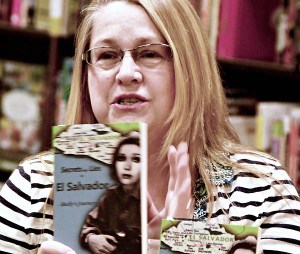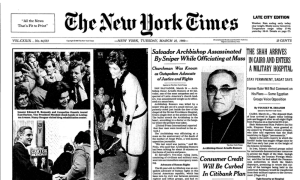Sherrie Miranda's Blog, page 188
June 7, 2015
The Art of Listening with Awareness
I share this because, in the case of my novel “Secrets & Lies in El Salvador,” I had to listen to many people. That is how I was able to allow many people’s voices to be heard. I never planned on using what people told me, I just wanted to hear their stories because I find history told from those who experienced it, much more interesting than what you find in history books.
The Art of Listening with Awareness
BY MARKUS KASUNICH
MAY 27, 2015
In the buzz of a vast information network that bombards the human consciousness with a combination of tantalizing mind-candy and instant sense gratification, we are being pressured to adapt by developing shorter attention spans. In the wake of this circus of data, are we actually paying attention to the information that we are moving at an astounding rate? In becoming “super-efficient,” are we forgetting how to really listen and therefore connect to the depth of the world around us?
Many commonly regard the words “hearing” and “listening” as synonyms. But the truth is they are not the same at all. Though “hearing” is the sense by which sound is perceived, “listening,” on the other hand, is defined by making an effort to hear something and taking the time to heed and/or pay attention to what you are hearing. This is an important distinction.
The art of listening with awareness is becoming less common in today’s faced-paced, info-mover society, but it is a vital empathic skill that is rooted in consciousness and needs attention and practice to be developed. When mastered, this way of “receiving” can create a sense of true connection. How you take in information and what perspective you listen from can transform the overall experience of your reality.
When there is little awareness in the quality of your listening, “by default” you function from a fairly unconscious, narrow bandwidth of your being which only offers a superficial perspective and lack of substance. This trend has translated into the desire to acquire ridiculous amounts of information and to obsessively “share” this data in a manner that can never be truly fulfilling. The solution is not about quantity of data but instead its quality. And the quality of your listening directly determines the quality of your integration and communication of that information.
Consider these tips when developing the quality of your listening:
All awareness needs space to flourish. Choose to listen to everything with a perspective of space and pause for reflection. This allows you to have a greater ability to respond rather than react. The difference between responding and reacting to anything is a simple pause of space that allows you to make a choice rooted in awareness.
Listen to your feelings. Be aware of how you feel. If you are listening to this powerful field of influence within you, it will reveal your conscious/unconscious relationship to past issues, dynamics, blockages, and unhealthy and outdated belief systems that create your triggers and may need your attention. It also reveals powerful clues to an expansive connection to yourself and the world around you.
Be present in the moment. Pay attention. So many tolerate “listening” until they get their moment to say something. This is not really listening; it is just waiting for your chance to speak. How can you be present with another person and actively listen if you are already consumed with your next thought in the immediate future? The ability to connect and respond to anything requires space to absorb what is being said and this deeper listening can be the difference between talking ‘to’ someone instead of talking ‘at’ someone.
Listen without an agenda. Often there is a predetermined agenda that filters your ability to connect. Listen from an open space with no plans, tactics, or predetermined judgment about the situation or experience. Notice how many of your encounters are just about acquiring data to justify a position to which you are invested. When this happens you may be missing out to the potential richness that is present for you.
Listen without trying to acquire anything. When you are listening from the limitation of the superficial mind, there is often a desire to try to acquire something – to add something to your repertoire, find the answer, or collect more data. There is a misconception on the spiritual path that we need to acquire: more systems, information, techniques or truths. Instead, these pieces of data are merely stepping stones to point you within, where everything you need is already present. Acquire nothing and discover everything.
Listen without the need to understand. Let go of trying to grasp everything. Sometimes it is more powerful to “put it on the back burner.” This leaves space to connect those dots and for realization to arise from within you. The “need to understand,” can diminish your ability to listen, feel, and integrate the inherent transmission present. Yes, it is necessary to understand, because when we do, it helps to soften and release the mind, which allows for more expansion. But release the desperate “need” to understand at the expense of deeper listening from beyond the mind… Listen with your heart.
Human beings are multidimensional receivers, absorbing a vast array of information from multiple realms of consciousness. Some of these “stations” that we listen to are very obvious, but some are very subtle. Don’t settle on what is obvious. Focus your intention, listen deeper, expand your bandwidth and explore the different and more subtle frequencies of awareness. The more deeply you refine your skills, the more access you will have to a vast network of information that can transform your perspective and connection to your inner and outer world… but only if you are willing to listen.
You will notice the more you are truly listening from your heart, the more you are able to hear.
Markus William Kasunich is a Holistic Life & Consciousness Coach, Spiritual teacher, Healer, Professional Speaker, Writer and Artist helping to reveal the unlimited potential of your True Self. With over 20 years of intensive study, exploration and practice, he shares his combined insight and gifts through private sessions, personal and online coaching, and also facilitates retreats, workshops, events and classes all over the globe for seekers from all walks of life. Through his powerful Holistic (Mind, Body, Spirit) approach of “Practical Spirituality” he explores, inspires and empowers your personal journey into the ever-evolving relationship with The Universe of You.
– See more at: http://www.tut.com/article/details/102-the-art-of-listening-with-awareness/?articleId=102undefined#sthash.ahAuM5Y0.dpuf
Do you know a/b my debut novel “Secrets & Lies in El Salvador”? A young American woman goes to war-torn El Salvador: http://tinyurl.com/klxbt4y


June 6, 2015
The One thing Every Author Should Know
Caroline Kerley shared this on Twitter.
@CM_Kerley
The One thing Every Author Should Know. Please share. http://smarturl.it/CALed http://youtu.be/Kdbb0S2rZ6E
Now do you really want to wait to get an agent?
This is what I can tell you from my own experience. You might spend a year trying to get one out of 100 agents asking for a partial. They still may reject the ms afterward.
Once they do accept taking you on as a client, they may spend 6 mos. trying to find the publisher if they really like your book, then they may give up and your ms just sits on a shelf.
If a publisher does choose to publish your book, you still have to wait nine months for it to be on the shelves.


June 2, 2015
Where do you get your ideas?
Where do your ideas come from? I must admit, not too many of my ideas come while driving. Anyplace but . . .


June 1, 2015
Video for the book “Secrets & Lies in El Salvador” made by Angelo & Sherrie Miranda
Please take a look at the video my husband and I made. He, Angelo Miranda wrote the song for my book.
I hope you enjoy the video! ;-)
Do you know a/b my debut novel “Secrets & Lies in El Salvador”? A young American woman goes to war-torn El Salvador: http://tinyurl.com/klxbt4y
The Kindle version is on sale right now for $.99. The paperback can be bought for $8.88.
http://www.amazon.com/Secrets-Lies-El-Salvador-Shellys/dp/1507837011/ref=cm_cr_pr_product_top?ie=UTF8


A children’s book that offers so much more
I can’t think of a better way to teach children than through a great story! ;-)
Do you know a/b my debut novel "Secrets & Lies in El Salvador"? A young American woman goes to war-torn El Salvador: http://tinyurl.com/klxbt4y
 Originally posted on MagScribe Promotions:
Originally posted on MagScribe Promotions:
Can Harraf Namrattle learn to think before she speaks and to be kind to the people in Tweeville?
Harraf Namrattle lives in Tweeville and always says what she thinks–no matter what! She doesn’t seem to understand that words can be hurtful and that some things are better left unsaid. Today, however, Harraf’s mother reminds her to,”Think before you speak!”
Harraf sets out to play baseball with her friend Bo, who has a new baseball mitt. What will she say when she sees it? Then she meets her friend Hennaj, who has a lemonade stand. What will she say when she tries the lemonade? When she sees another friend drawing on the sidewalk, will she take her mother’s advice and be nice?
In the spirit of Dr. Suess and Shel Silverstein-her favorites- author and certified counselor Shirin Zarqa-Lederman uses brightly colored images and simple, silly prose to challenge young readers while engaging them…
View original 125 more words


May 29, 2015
The “American Dream” is the real problem. (response article)
Please see my own comments after the article.
Do you know a/b my debut novel “Secrets & Lies in El Salvador”? A young American woman goes to war-torn El Salvador: http://tinyurl.com/klxbt4y
 Originally posted on Kamala Thompson:
Originally posted on Kamala Thompson:
“Bill O’Reilly, Russell Simmons Go Head-To-Head Over Violence In Black Communities”
“The bigger issue that you are not acknowledging is that the astronomical crime rate among young black men — violent crime — drives suspicion and hostility,” O’Reilly said. “You won’t acknowledge it, Russell. You won’t acknowledge it.”
“The crime rate is driven by the dissolution of the family,” O’Reilly argued. “No supervision, kids with no fathers — the black neighborhoods are devastated by the drug gangs who prey upon their own. That’s the problem!”
There are serious human rights issues being brought to the light, but little practical solutions being presented because we are not looking at the larger societal structures in place. So, let me break it down like this: We live in America, where we are corrupted by the overwhelming desire for financial prosperity and upward success, but not everyone in America has the resources…
View original 231 more words


May 28, 2015
Honor Comes Late to Óscar Romero, a Martyr for the Poor
AMERICAS
Honor Comes Late to Óscar Romero, a Martyr for the Poor
By ELISABETH MALKINMAY 22, 2015
SAN SALVADOR — María de los Angeles Mena Alvarado knelt at the tomb of the slain archbishop and wept.
She had come to the crypt of the city’s cathedral to pray for a cure for the diabetes that was threatening her eyesight and weakening her kidneys. “I feel that, yes, he can perform a miracle,” said Ms. Mena, 62.
Thirty-five years after Óscar Romero, the Roman Catholic archbishop of San Salvador, was assassinated with a single bullet as he said Mass in a modest chapel here, this small country is celebrating his beatification on Saturday, the final step before sainthood.
For many here and in the rest of Latin America, though, Archbishop Romero is already a saint.
His tireless advocacy for the poor resonates deeply in a region where the gulf between those with riches and those without remains vast. He was the champion of impoverished Salvadorans, his homilies and radio broadcasts giving voice to their struggles. And as political violence battered the country and death squads killed any activist who challenged the existing order, the archbishop was defiant.
“I have frequently been threatened with death,” he said two weeks before he was killed. “If they kill me, I shall rise again in the Salvadoran people.”
The decision by Pope Francis to declare Archbishop Romero a martyr to the faith and speed up the long-stalled process toward his sanctification is widely seen as a recognition of the deep pastoral commitment the archbishop demonstrated, at the cost of his life.
“He spoke the truth; he spoke through facts,” said Eva Menjívar, a former Carmelite nun who knew him in the 1970s and continues as a religious worker in poor communities. “We have never stopped teaching the spirit and values of Monsignor Romero.”
For decades, the conservative Vatican hierarchy was suspicious of Archbishop Romero, as it was of many Latin American priests who were influenced by liberation theology, which challenges the social and economic structures that perpetuate poverty. Even today he remains a divisive figure in El Salvador, where some on the right believe he was a communist in clerical garb.
Archbishop Romero never identified himself with liberation theology. But as an advocate for the poor, “he took sides; he was not a neutral bystander,” said Robert Ellsberg, a scholar and publisher of Orbis Books, a Catholic publishing house. “He spoke out clearly without compromise against the violence and injustice of the elite.”
In that sense, he had much in common with Pope Francis, who has said he wants “a poor church for the poor.”
The Rev. Gustavo Gutiérrez, the Peruvian priest whose 1971 book first outlined liberation theology, said Archbishop Romero was motivated by the poverty and suffering he saw in El Salvador rather than by any ideology. “Monsignor Romero now appears to be understood, as he was also very misunderstood,” he said.
Before Archbishop Romero was appointed in 1977, he had not confronted the growing military repression directly. But a few weeks later, a Jesuit priest and friend, the Rev. Rutilio Grande, was assassinated. The archbishop celebrated Mass several weeks afterward and then organized a procession through the rural town where Father Grande had been organizing farmworkers, recalled the Rev. Jon Sobrino, a liberation theologian who became an adviser.
The group suddenly encountered soldiers with their rifles drawn and stopped short. But from the back of the file the archbishop’s voice rang out, urging people, “Forward!” The soldiers lowered their rifles.
In the context of the Cold War, Archbishop Romero’s stance marked him as subversive in the eyes of the United States-backed Salvadoran military, even though he also criticized violence by the guerrillas.
The month before he was killed, Archbishop Romero wrote to President Jimmy Carter to ask him to end United States support for the military. Then, on March 23, 1980, he called on soldiers to disobey illegal orders. “The peasants you kill are your own brothers and sisters,” he said.
Salvador Archbishop Assassinated by Sniper While Officiating at Mass
The next day, a red Volkswagen pulled up outside the chapel at the cancer hospice where he lived, and a shot was fired from the car’s back window through the chapel doorway to the altar, and the archbishop fell bleeding.
A United Nations truth commission found that his murder was planned by a group of officers led by Roberto d’Aubuisson, a former army major who led the death squads. Nobody was ever prosecuted for the assassination, and Mr. d’Aubuisson died of cancer in 1992. Left open is whether he was acting for someone in the oligarchy.
At the archbishop’s funeral, snipers fired on mourners, killing as many as 40 people amid scenes of panic.
In the months after Archbishop Romero’s death, the violence escalated into a brutal civil war in which at least 75,000 people were killed before peace accords were signed in 1992. Under President Ronald Reagan, Washington sent as much as $1.5 million a day to support the Salvadoran military.
The long-awaited recognition for Archbishop Romero comes to a country and a region that is very different in some ways. But the daily reality of the poor has changed little.
Right-wing military dictatorships have been swept away in Latin America. Outright political violence is rare, and in all but a few countries there is a vibrant civil society that is free to criticize governments without fear.
In El Salvador, the warring sides of the civil war now compete in elections, and President Salvador Sánchez Cerén is a former guerrilla commander.
Democracy has proved a profound disappointment, though. Inequality is as entrenched as it was in Archbishop Romero’s time, and the poor of El Salvador — along with those in many other countries in Latin America — now live in the grip of criminal, not political, violence.
“The violence now is of the poor against the poor,” said Roberto Cuéllar, a lawyer who worked with Archbishop Romero to offer legal services to the poor and document human rights abuses. “He would be bitter to see that after reaching the peace accords that we are still in the same place.”
Msgr. Ricardo Urioste, who was the vicar general to Archbishop Romero, said the Salvadoran church had failed to take a role in addressing the gang violence that rages through the poor neighborhoods.
“I think the church should take a more active part,” said Monsignor Urioste, taking a sharply critical view of a hierarchy that has long resisted honoring the archbishop. “I think if Monsignor Romero were here he would talk to the gangs, something no bishop is doing here. And he would be talking about injustice.”
The question now is whether Archbishop Romero’s beatification will prove to be merely a symbol or a watershed for Latin America.
Many Central Americans — almost 50 percent of Salvadorans are younger than 25 — have no direct memory of the wars that racked the region and the role that socially committed priests played.
And a generation of young people who were inspired by liberation theology in the 1970s have moved on, preferring to work in human rights, labor organizing, legal aid or economic development. They have helped to enrich civil society, where the church now plays a much smaller role.
Those who revere Archbishop Romero worry that the long-awaited official recognition may simply be an effort to soften his legacy. “It is an attempt to claim his message,” Lissette Hernández, 42, who works on rural development projects, said after a concert in the archbishop’s memory. “He was correct in the way he lived the Gospel.”
“I have mixed feelings” about the beatification, she said. “Nobody has asked for forgiveness or solved the crime.”
Gene Palumbo contributed reporting.
A version of this article appears in print on May 23, 2015, on page A4 of the New York edition with the headline: Honor Comes Late to Martyr for the Poor.
The assassination of Monseñor Romero is in my novel. Do you know a/b my debut novel “Secrets & Lies in El Salvador”? A young American woman goes to war-torn El Salvador: http://tinyurl.com/klxbt4y


May 25, 2015
What Would Oscar Romero Say Today About El Salvador?
God’s Politics Blog
What Would Oscar Romero Say Today About El Salvador?
by Rev. Timothy Kesicki
Two years ago I was in El Salvador and asked a fellow Jesuit priest if he thought that Archbishop Oscar Romero — famously slain while celebrating Mass in 1980 — would ever be beatified. The Salvadoran Jesuit’s answer: only when all of the people who loved Romero, and all of the people who hated him, were dead.
Fortunately, that prediction turned out to be grossly off the mark, as Pope Francis will beatify Oscar Romero on May 23, putting him one step shy of formal sainthood.
At the height of El Salvador’s civil war, Romero was a lightning rod with enemies. One of the most prominent Salvadorans to call out the country’s government and military leaders to end their bloody and oppressive human rights violations, he was also an outspoken advocate for the poor.
Shot to death by an unknown assassin said to be acting on the orders of the Salvadoran army, Romero used his last homily to call on soldiers to listen to their consciences and disregard orders to kill fellow Salvadorans.
If he were alive today, what would Romero say from the pulpit?
El Salvador’s civil war is long over, but the violence and inequality haunting the nation is as real as it was back in the 1980s. Children and families continue to flee El Salvador, Guatemala, and Honduras because the region is the deadliest non-war zone in the world. Jesuits working in ministries throughout North America and Central America encounter these faces of human suffering daily.
While last year’s media spotlight on the Central American children and families crossing the U.S. border has faded, the humanitarian emergency gripping the region continues. The number of children and families reaching the U.S. may have dropped, but it is not because the violence has diminished or people have stopped fleeing.
Instead our government, which already spends nearly $18 billion on immigration enforcement in the U.S., has now leveraged funding, training, and diplomatic pressure to impel Mexico and Central America to intercept desperate people, some fleeing violence and persecution, from journeying beyond borders to find safety. The U.S. has invested heavily in border security and immigration control, despite grave and troubling human rights violations. Meanwhile, we have failed to publicly and persistently convey the message that asylum seekers, victims of human trafficking, and refugees must be screened and not returned to the hands of their persecutors.
The Obama administration’s FY2016 budget request includes $1 billion for Central American assistance, some of which would be allocated for development and poverty reduction projects. However, it also proposes pumping hundreds of millions more into the militarization of Central American societies and borders, a plan that would further deteriorate the human rights situation. Absent is a vision of how to address the urgent humanitarian needs of people displaced by violence.
Instead of funding the militarization of the borders between the U.S. and Central America and intercepting refugees before they reach our country, we must address the root causes of migration and provide direct assistance that builds the capacity to address humanitarian needs.
Central America needs help expanding education opportunities, building child welfare systems, and sheltering victims of violence and witnesses to crime. But none of these reforms can be sustained unless Central American governments also work to eradicate corruption and reform their judicial systems.
As Romero said during a time of similar urgency, “On this point there is no possible neutrality. We either serve the life of Salvadorans or we are accomplices in their death. … We either believe in a God of life or we serve the idols of death.”
Finding a viable solution to Central America’s problems while offering appropriate protection to those fleeing violence may be an uncomfortable conversation, but the U.S. will face an even more uncomfortable result if we continue our out-of-sight, out-of-mind attitude toward Central America’s desperate and dispossessed victims of violence.
The Rev. Timothy Kesicki is president of the Jesuit Conference, the organization that represents the Society of Jesus (Jesuits) in Canada and the United States. Via RNS.
The assassination of Archbishop Romero is in my novel “Secrets & Lies in El Salvador” American woman goes to war-torn El Salvador: http://tinyurl.com/klxbt4y


War (An Abstraction Poem)
One of my dreams is to put together an anthology about how war affects not only the soldier, but every man, woman & child in that soldier’s life, not to mention all the people in the land that was under attack.
Do you know a/b my debut novel “Secrets & Lies in El Salvador”? A young American woman goes to war-torn El Salvador: http://tinyurl.com/klxbt4y
 Originally posted on Kate M. Colby :
Originally posted on Kate M. Colby :
In honor of Memorial Day (a U.S. holiday honoring military servicemen and women), I wanted to share this poem from my university days.
War
is the dog(tag) catcher,
the cannon fodder rain,
the sloppy mud trenches
that caused the insatiable itch
in your missing arm.
“War” was part of my collection, “Olive Branch,” which I presented at the 2013 Sigma Tau Delta Convention. It was also featured in Watershed, Baker University’s literary magazine.


May 21, 2015
#BeWoW & #1000 SPEAK FOR COMPASSION – “Connection”
I feel very fortunate that I am finally with that person who mirrors me, connects with me and understands me (even if we have to talk for hours to gain that understanding). I wish the same for all of you.
Do you know about my debut novel “Secrets & Lies in El Salvador”? A young American woman goes to war-torn El Salvador: tinyurl.com/klxbt4y
 Originally posted on Silver Threading:
Originally posted on Silver Threading:


“A Connection”
I seek the compassionate divinity of communing with another soul,
of hearing jumbled thoughts pour out of troubled hearts
that are ready to blossom forth like a daisy in the sand.
I seek a joining to the rest of our disjointed humanity,
a chance to share the hurried threads of
some meaningful conversation,
with no assumptions or prejudices
of who I am or who they presume me to be.
I seek a bond that will unite,
a friendship into a community.
I
Seek
A
Connection.
It seems funny to talk about making connections in our supercharged internet world of today where every thought and image is displayed on social media sites around the world in just seconds flat. How can it be that people find it hard to connect, or to get to know each other?
Our friends and family are our earliest human contacts. Through them, we…
View original 115 more words








